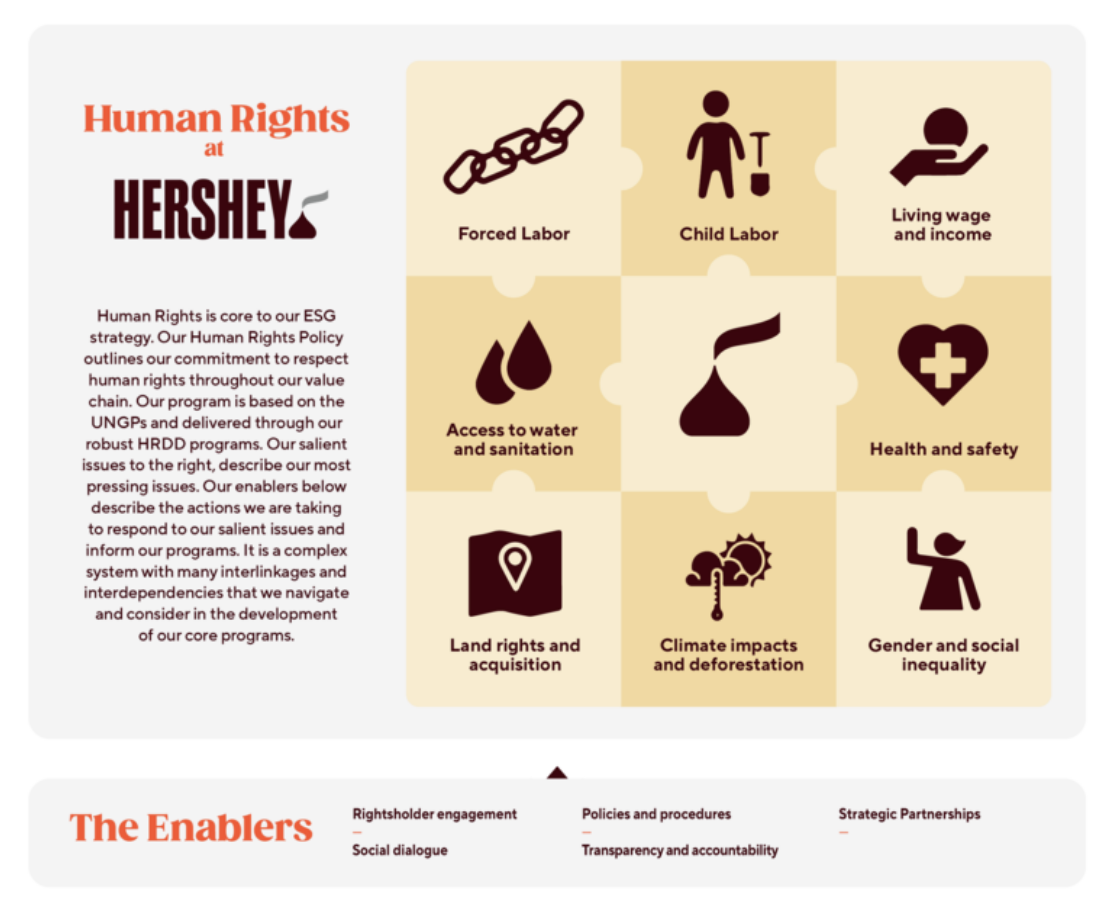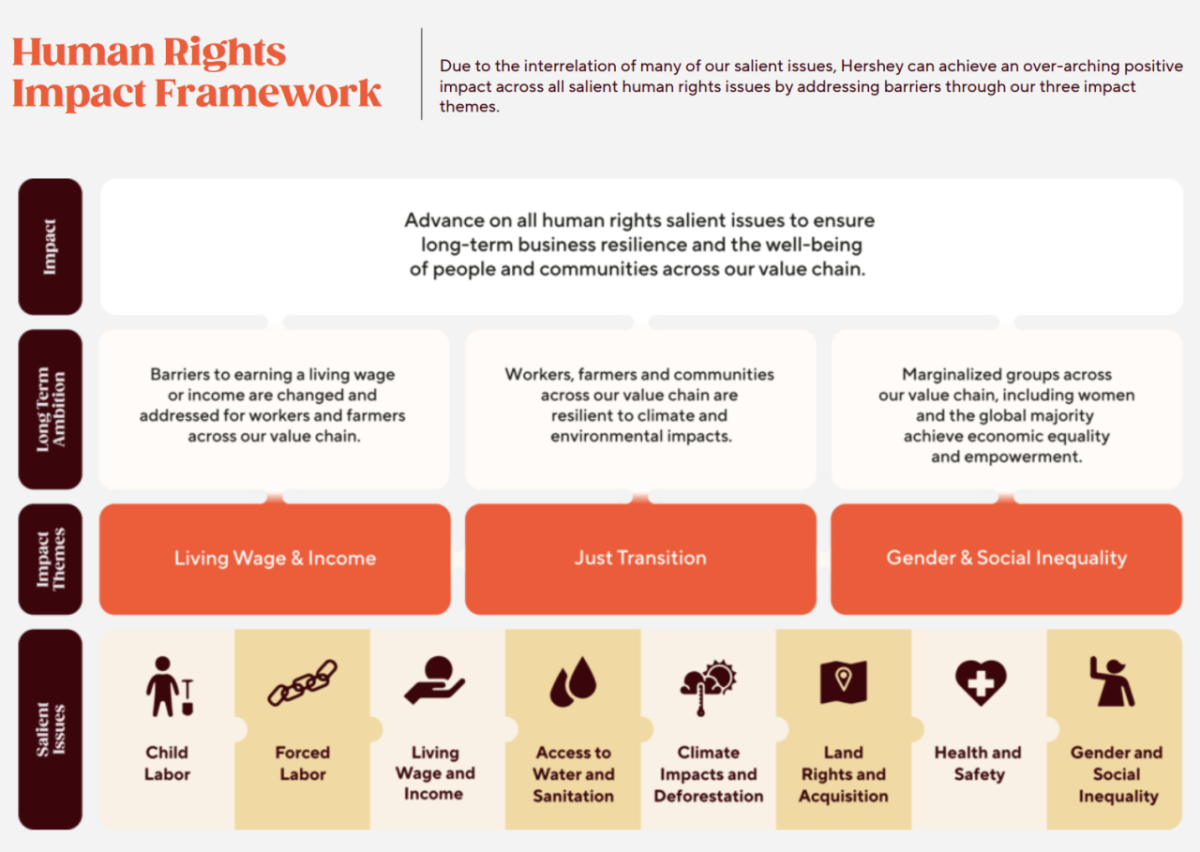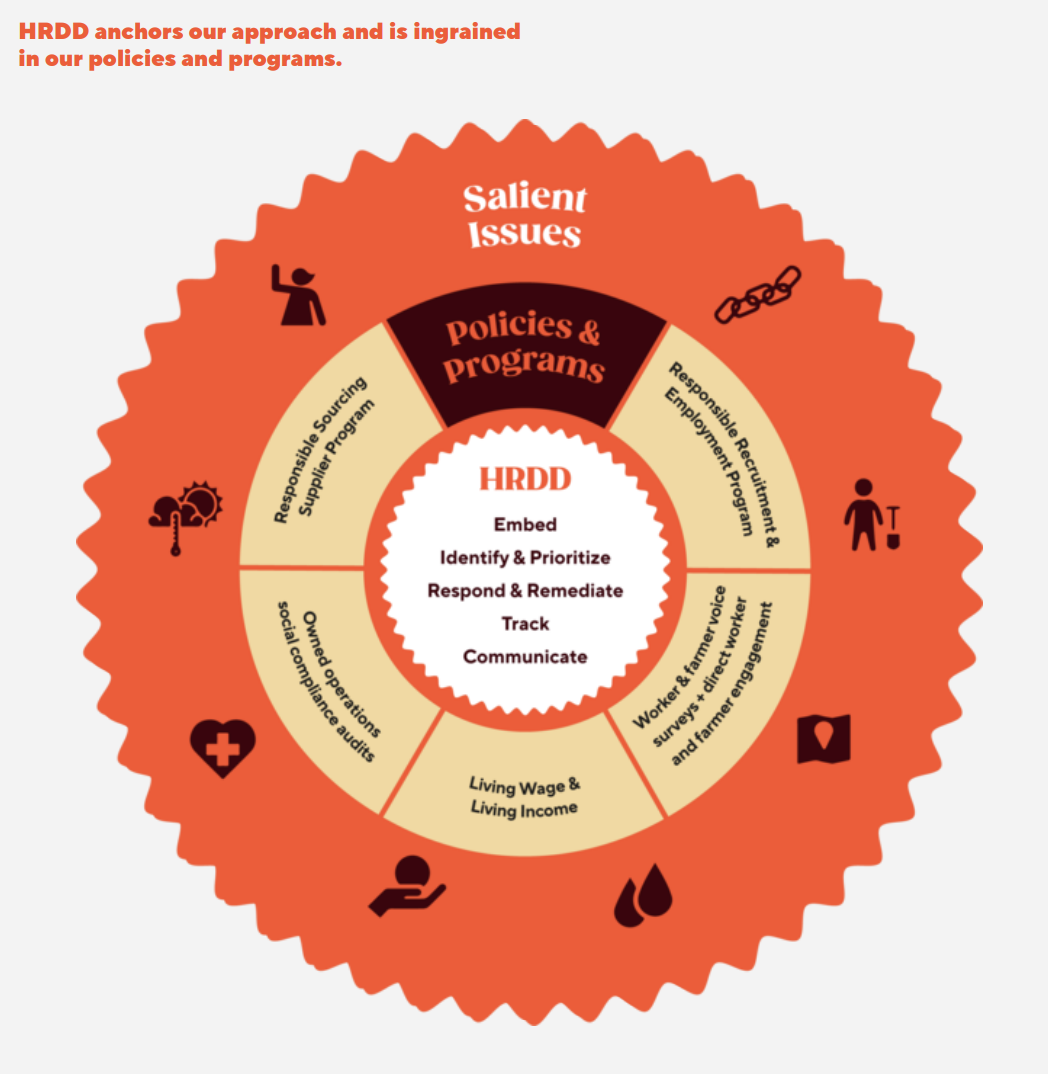Human Rights Across Hershey’s Value Chain
Originally published in Hershey's 2023 ESG Report
Protecting human rights is fundamental to our long-term success.
We believe our presence in the communities where we operate is vital. The diverse, exceptional individuals within Hershey and those engaged in our value chain are pivotal to the enduring success of our company.
Our commitment to equality and non-discrimination underscores our dedication to treating everyone with dignity and respect. We promote the human rights of all people throughout our value chain and recognize our salient human rights issues are intricately linked. We aim to address issues such as the:
- Disproportionate impact of climate change on vulnerable communities and the importance of a just transition
- Interconnectedness of income disparities with challenges like child labor and deforestation
- Unequal access to resources and opportunities that contribute to systemic barriers for marginalized groups
Efforts encompass due diligence and programming across our value chain, including our operations and supply chain.
Human Rights Strategy
Our strategy is guided by our salient issues and implemented through due diligence processes, applying the United Nations Guiding Principles on Business and Human Rights (UNGPs) and the Organization for Economic Co-operation and Development Guidelines for Multinational Enterprises (OECD Guidelines). To enable rightsholders to exercise their fundamental human rights, we regularly identify, evaluate and prioritize action on the most significant, relevant risks. When we identify negative impacts, we seek to mitigate them and take corrective action.
Accountability for managing our human rights agenda is embedded in our ESG governance structure. The Director of Global Sustainability and ESG, Director of Responsible Sourcing and Head of Sustainable Sourcing Cocoa oversee day-to-day management. They are also responsible for the development and implementation of our due diligence programs and reporting frameworks. These initiatives aim to identify, safeguard against and address human rights risks and concerns. These risks encompass issues like forced and child labor, which span agricultural and manufacturing supply chains.
- See page 41 for more on human rights due diligence.
- Our other actions to protect human rights, including our ambition to eliminate child labor, are in the Cocoa chapter of this report.
Material ESG issues:
- Deforestation
- Human rights (supply chain)
Salient Human Rights Issues:
- Climate impacts and deforestation
- Forced labor
- Land rights and acquisition
Policies That Guide Us
Several policies, standards and expectations guide us on human rights issues. Our Human Rights Policy, which was updated in 2023, outlines our commitment to respect human rights throughout our value chain, including preventing and addressing modern slavery and forced labor. It was developed in accordance with the UNGPs.
We use the UNGPs, OECD Guidelines and other leading standards and frameworks to inform our approach. We review policies and programming, evolving them to ensure they remain relevant and effective in light of:
- Outcomes from our due diligence process
- Shifts in regulatory, non-governmental organization (NGO) and investor expectations
- Changes in our business
Beyond the Human Rights Policy, human rights standards are addressed in key documents including:
- Code of Conduct
- Ethics & Compliance: Hershey’s Concern Line
- Human Rights Policy
- Supplier Code of Conduct
- Living Wage & Income Position Statement
- Responsible Recruitment & Employment Policy
- Deforestation and Conversion-free Policy
- Responsible Palm Oil Sourcing Policy
- Responsible Pulp & Paper Sourcing Policy
- Statement Against Slavery & Human Trafficking
- Sustainable Sugar Sourcing Policy
Concentrating on Our Most Salient Human Rights
We focus action on areas presenting the highest risk to people and greatest potential for improving their lives.
Adopting guidance in the UNGPs, we regularly conduct saliency assessments and reviews to update our human rights agenda. In 2022, we worked with the consultancy twentyfifty to update our human rights saliency assessment. The results reaffirmed key risks and where we remain focused including child labor, forced labor, living wage and income.
We also used the process to refine our understanding of how Hershey might cause, contribute or be linked to topics including gender and social inequality, climate impacts and other root causes of poverty.
- See page 117 for Salient Human Rights Issues Definitions.
- Learn more about Maintaining Focus on Our Most Salient Human Rights on page 44 of our 2022 ESG Report.
The 2022 saliency assessment included Hershey-owned operations and our upstream and downstream supply chains. It involved extensive research on the cultural, economic, geographic and social factors that influence the enjoyment of rights. It also engaged internal and external stakeholders, including investors, NGOs, suppliers and Hershey leaders. Where possible, we looked to external organizations, including advocacy organizations, to stand as proxies for important rightsholders.
In 2023, we expanded saliency work to create an impact framework to inform strategic programming that supports our human rights agenda. Partnering again with twentyfifty, we examined interlinkage between our salient issues, strategic gaps and existing best practice research. That examination identified areas that cut across all our salient issues, so we can maximize impact on all issues by focusing in those areas.
This new framework:
- Reaffirmed our focus on living wage and income
- Highlighted opportunities to prioritize just transition and gender issues, and embed them in our programming
We will work to adapt programming based on these crosscutting themes.
Human Rights Due Diligence (HRDD)
HRDD is an ongoing risk management process that enables us to identify, prevent and mitigate current and potential human rights risks throughout our value chain, focusing on our most salient issues. Hershey’s HRDD process is designed using the UNGPs and a risk methodology developed with leading nonprofit Verité.
We refresh our HRDD periodically, using updated risk indices for specific ingredients and countries to keep it relevant and effective. In 2023, we partnered with twentyfifty to map, communicate and confirm the strength of our HRDD risk assessment approach. We identified six key steps in our risk assessment process which is described in our 2023 Statement Against Slavery & Human Trafficking.
We also regularly evaluate our HRDD for effectiveness against requirements in the UNGPs and OECD Guidelines. This highlights key strengths and areas to improve in our strategy and programs. Our last assessment in 2022 confirmed:
- Key strengths include our governance structure, training and responsible sourcing and supply chain due diligence.
- We have opportunities to improve rightsholder engagement, grievance mechanisms and access to remedy. We continue efforts to reinforce these area by collaborating with peers, suppliers, NGOs and governments.
Ongoing programming includes conducting HRDD at Hershey facilities, as well as suppliers and labor providers that have been identified as high-risk through our risk assessment process. Due diligence on human rights and labor issues are a key part of our Responsible Sourcing Supplier and Responsible Recruitment Programs.
We assess forced labor and other human rights risks before entering into commercial relationships through risk screening in our Tier 1 supplier qualification process.
- Learn more about our Human Rights Due Diligent Approach in our 2023 Statement Against Slavery & Human Trafficking.
- Learn more in Sourcing Our Priority Ingredients and Materials on pages 48-52.
Human rights issues must be addressed through a comprehensive approach that gets to the root of systemic issues.”
Maddy Eldredge, Human Rights Analyst, Global Sustainability and ESG, The Hershey Company
Listening and Taking Action
We offer several mechanisms for our employees and other stakeholders to report grievances and seek resolution.
How We Listen:
- Our Concern Line, detailed in Ethics and Compliance (page 16), which accepts complaints on any issue, including human rights.
- We require our direct suppliers to operate grievance mechanisms. We validate this in thirdparty social compliance audits and cocoa, sugar and palm oil supplier sustainability assessments.
- Our public Grievance Process for the Implementation of The Hershey Company’s Responsible Palm Oil Sourcing Policy.
- Certification bodies’ and standards-setting organizations’ grievance mechanisms.
- Worker and farmer voice surveys, while not a formal grievance process, help indicate potential rightsholder concerns.
Grievance Mechanisms and Access to Remedy
In line with the UNGPs, we seek to offer access to effective remedy whenever our operations may cause or contribute to adverse human rights impacts. We also urge suppliers and business partners to provide remedy when we find such impacts connected to our supply chain.
Anyone reporting a grievance in good faith is free from retaliation or retribution. Where relevant they may use our mechanisms in addition to other channels or procedures, such as local law enforcement. We also partner with others to help prevent, mitigate and remedy adverse impacts.
Human Rights Training
Hershey employees last completed the human rights module in our Code of Conduct training in 2022. The module is scheduled as part of Hershey’s mandatory Code of Conduct training every three years, with select rotating topics set by our Ethics & Compliance team.
It covers:
- An overview of fundamental human rights
- How to identify and report a human rights violation
- A case study on indicators of forced labor, including recruitment fees
Additionally, we offer optional, supplemental human rights training in our Learning System in English, Spanish, French, Chinese, Portuguese and Hindi. It covers:
- Hershey’s salient human rights issues, including forced labor and child labor
- The UNGPs
- Business impacts on human rights
- Human rights in our value chain
- How we address and promote respect for human rights
- How to identify and report a human rights violation
- Human rights considerations in purchasing practices
- How to be an internal champion for human rights
Since 2020, more than 1,600 employees have taken this supplemental training opportunity.
- Learn more about human rights training in our 2023 Statement Against Slavery & Human Trafficking.
- Find out more about Our Salient Issues in Hershey's Commitment to Human Rights.



